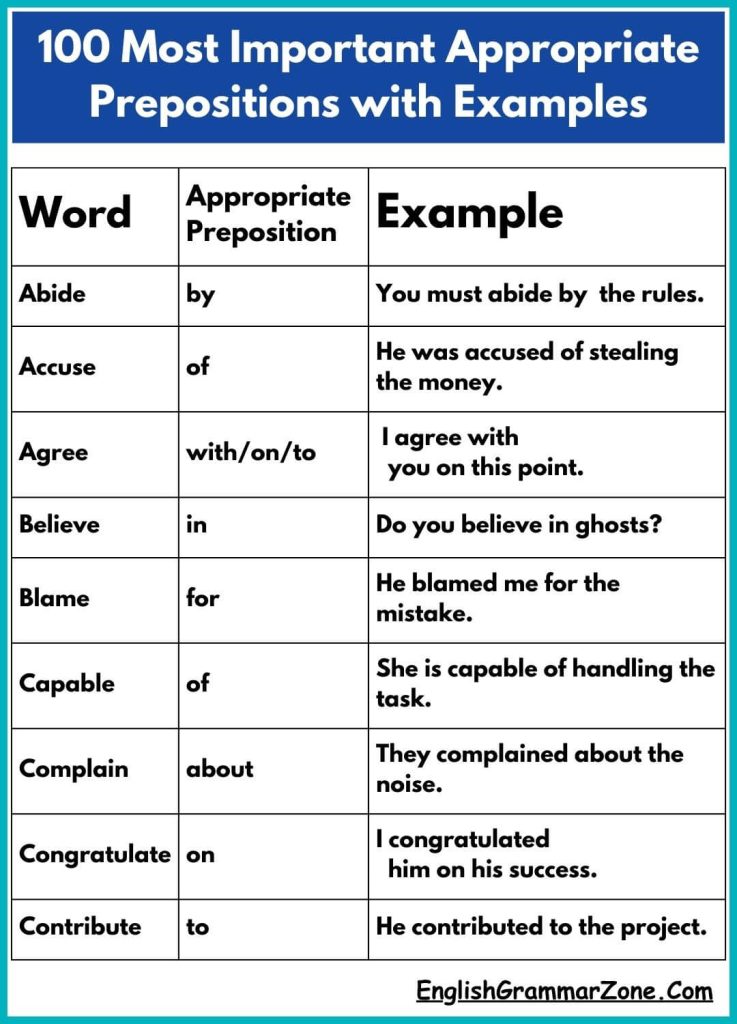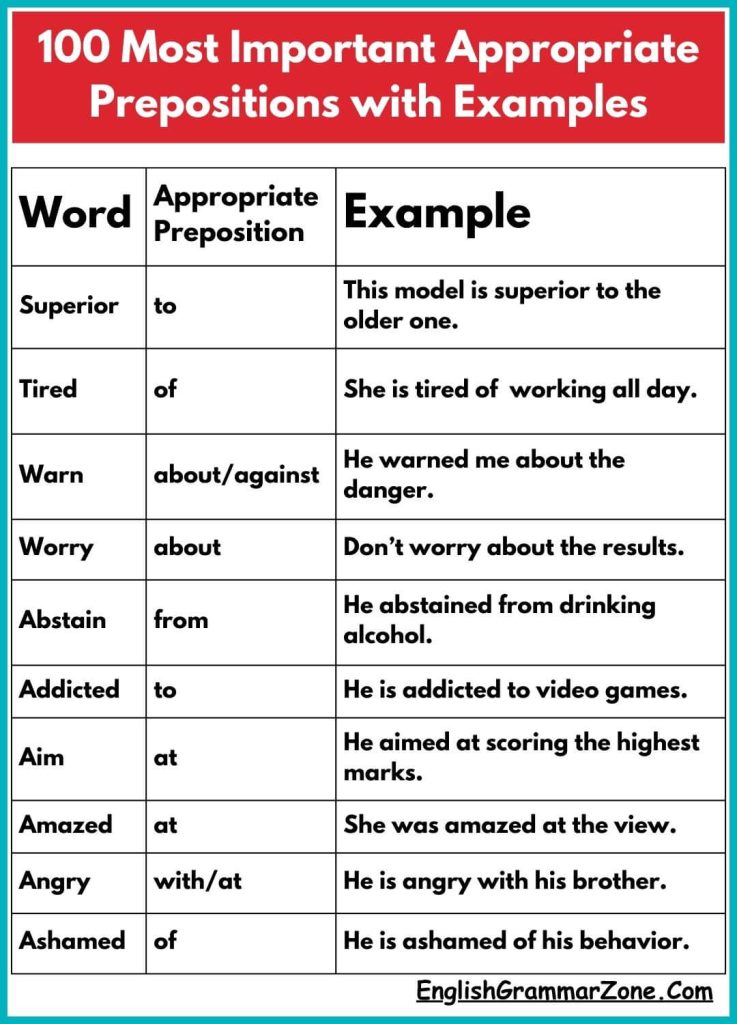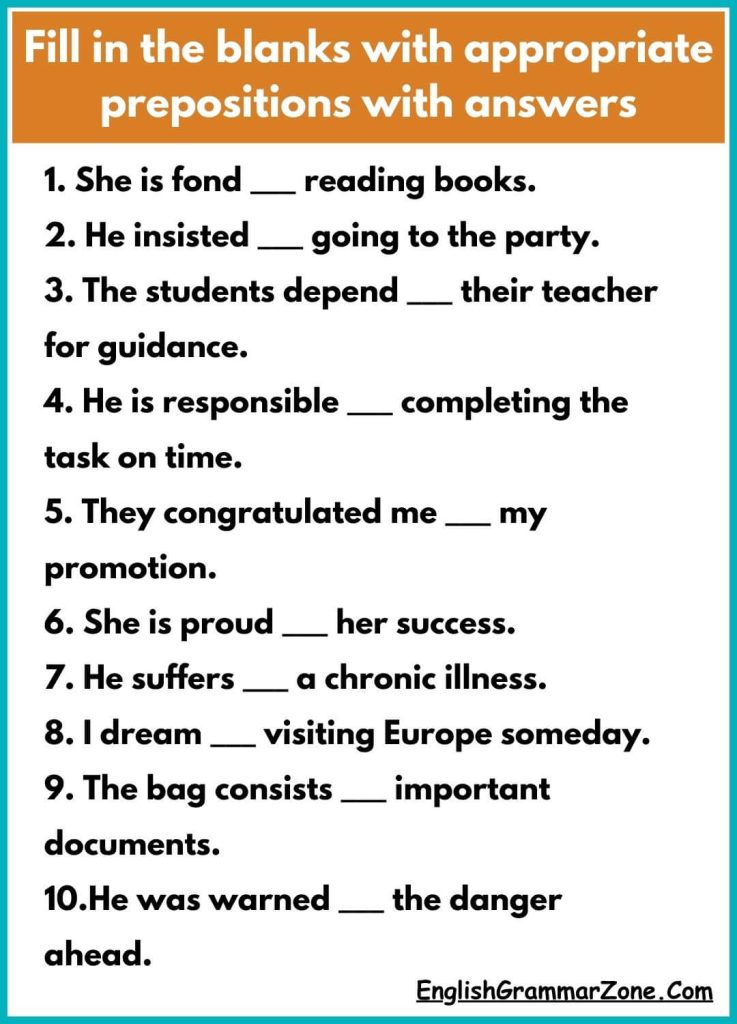Understanding appropriate prepositions is essential for building accurate and meaningful sentences in English. Appropriate prepositions are often tested in competitive exams, and mastering them can help beginner English learners improve their grammar and language skills effectively.
What is an Appropriate Preposition?
An appropriate preposition is the correct preposition that connects a word (usually a verb, noun, or adjective) to the rest of the sentence. Choosing the right preposition ensures that the sentence conveys the intended meaning clearly and correctly.
For example:
- She is good at
- He is interested in reading books.
Here, “at” and “in” are the appropriate prepositions that correctly connect the words “good” and “interested” to their respective objects.

100 Most Important Appropriate Prepositions with Examples
| Word | Appropriate Preposition | Example |
| Abide | by | You must abide by the rules. |
| Accuse | of | He was accused of stealing the money. |
| Agree | with/on/to | I agree with you on this point. |
| Believe | in | Do you believe in ghosts? |
| Blame | for | He blamed me for the mistake. |
| Capable | of | She is capable of handling the task. |
| Complain | about | They complained about the noise. |
| Congratulate | on | I congratulated him on his success. |
| Contribute | to | He contributed to the project. |
| Depend | on | Success depends on hard work. |
| Deprive | of | The illness deprived him of energy. |
| Devoted | to | She is devoted to her work. |
| Differ | from | This design differs from the old one. |
| Dream | of | He always dreams of becoming a pilot. |
| Famous | for | The city is famous for its monuments. |
| Fond | of | She is fond of chocolates. |
| Grateful | to/for | I am grateful to you for your help. |
| Guilty | of | He was found guilty of theft. |
| Insist | on | They insisted on going out. |
| Interested | in | He is interested in music. |
| Known | for | The author is known for his stories. |
| Listen | to | I like to listen to classical music. |
| Loyal | to | Dogs are loyal to their owners. |
| Proud | of | She is proud of her achievements. |
| Responsible | for | He is responsible for the project. |
| Succeed | in | She succeeded in passing the test. |
| Suffer | from | He suffers from back pain. |
| Superior | to | This model is superior to the older one. |
| Tired | of | She is tired of working all day. |
| Warn | about/against | He warned me about the danger. |
| Worry | about | Don’t worry about the results. |
| Abstain | from | He abstained from drinking alcohol. |
| Addicted | to | He is addicted to video games. |
| Aim | at | He aimed at scoring the highest marks. |
| Amazed | at | She was amazed at the view. |
| Angry | with/at | He is angry with his brother. |
| Ashamed | of | He is ashamed of his behavior. |
| Aware | of | Are you aware of the consequences? |
| Consist | of | The team consists of five members. |
| Hope | for | We all hope for a better future. |
| Laugh | at | They laughed at his jokes. |
| Look | after/for | Please look after the kids. |
| Remind | of | This picture reminds me of my childhood. |

Fill in the blanks with appropriate prepositions with answers
- She is fond ___ reading books.
- He insisted ___ going to the party.
- The students depend ___ their teacher for guidance.
- He is responsible ___ completing the task on time.
- They congratulated me ___ my promotion.
- She is proud ___ her success.
- He suffers ___ a chronic illness.
- I dream ___ visiting Europe someday.
- The bag consists ___ important documents.
- He was warned ___ the danger ahead.
Answers:
- of
- on
- on
- for
- on
- of
- from
- of
- of
- about

Frequently Asked Questions on Appropriate Prepositions
- What is an appropriate preposition?
An appropriate preposition is the correct preposition that fits naturally with a specific word to form a meaningful sentence. - Why are appropriate prepositions important?
Appropriate prepositions are important for clear and accurate sentence construction, especially for competitive exams and effective communication. - What is the best way to learn appropriate prepositions?
The best way to learn appropriate prepositions is by practicing with examples, using worksheets, and memorizing common word-preposition pairs. - How can I improve my preposition skills?
You can improve your preposition skills by reading regularly, solving exercises, and paying attention to word-preposition combinations in sentences. - Are prepositions tested in competitive exams?
Yes, appropriate prepositions are frequently tested in competitive exams to assess a candidate’s understanding of grammar and sentence structure.

